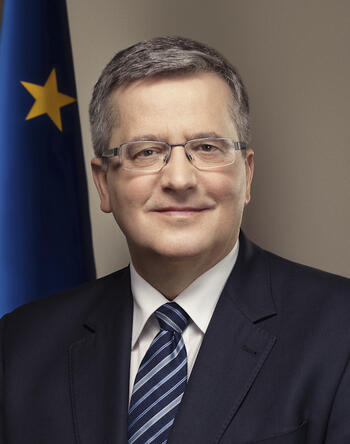Bronisław Komorowski, a former anti-communist opposition activist, member of Parliament, Minister of National Defence, and Marshal of the Sejm of the Republic of Poland, was President of Poland from 2010-2015.
During the '60s and '70s, Komorowski was deeply involved in opposition activities. Komorowski worked as a printer, journalist, distributor and publisher of the underground press. In the years of opposition activities, he was frequently arrested and victimized. During martial law, he was interned.
He defended his MA thesis at the Faculty of History at the University of Warsaw. In 1977 he worked in Zespół Prasy Pax, and in 1980- 1981 at the Social Research Centre NSZZ Solidarność (Independent and Self-governing Trade Union Solidarność) of the Mazovian Region. From September 1982 he worked as an editor of the independent, underground magazine “ABC” (Adriatic – Baltic – Black Sea).
From 1991 to 2010 he was Member of Parliament for consecutive terms in the Sejm. He worked in the Commission for Poles Overseas and in the Commission for National Defense, and then in the Commission for Foreign Affairs. From 1997 to 2000 he presided over the Sejm Commission for National Defense. From 2001 he was deputy chairman of the Sejm commission for National Defense and a member for the Sejm Commission for Foreign Affairs.
As a result of the tragic death of President Lech Kaczyński in the Smoleńsk catastrophe on April 10th, 2010, Komorowski became Acting President of the Republic of Poland under the regulations of the Constitution. He later won the presidential election on July 4, 2010, and took office on August 6, 2010.


